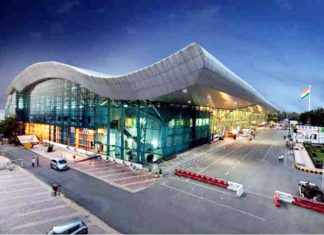India ranks at 64 as the best country for remote work, 15 places lower compared to 2022
New Delhi, Oct 19, 2023- India ranks at 64 as the best country for remote work, according to new research by the cybersecurity company NordLayer. It ranks 15 places lower compared to 2022. Last year, the company created the Global Remote Work Index (GRWI), which reveals the best and worst countries to work remotely in terms of four different criteria: cyber safety, economic safety, digital and physical infrastructure, and social safety.
This year, NordLayer evaluated 108 countries compared to 66 last year.
Here are the top 10 countries that are best for remote work according to this year’s data:
Denmark
The Netherlands
Germany
Spain
Sweden
Portugal
Estonia
Lithuania
Ireland
Slovakia
The index was compiled by assessing and comparing countries using four index dimensions. Under each dimension are various attributes (sub-dimensions) that, combined, help evaluate general remote-work attractiveness:
Cyber safety – infrastructure, response capacity, and legal measures.
Economic safety – tourism attractiveness, English language proficiency, cost of living, and healthcare.
Digital and physical infrastructure – internet quality and affordability, e-infrastructure, e-government, and physical infrastructure.
Social safety – personal rights, inclusiveness, and safety.
How does India rank?
India takes the 49 spot in the GRWI. This low position is due to India’s poor results in all four dimensions, primarily because of its digital and physical infrastructure (77) and social safety (74).
Regarding digital and physical infrastructure, India’s e-infrastructure is among the world’s worst, taking 95 place. The internet connection here is neither affordable (78t) nor good quality (70). Regarding social safety, India seems to be one of the isolating countries globally, with a low personal rights index (88) and poor inclusiveness environment (65).
In terms of cyber and economic safety, India performs mediocre (56 and 55 respectively). India is one of the cheapest destinations with the third lowest cost of living. However, healthcare (93) might not be appealing for travelers. India has an alright cyberinfrastructure (13) and response capacity (19).
India, from the region’s perspective
India looks more favorable than its two bordering countries, Pakistan (93) and Nepal (89).
One of the areas where India received high evaluation is its cyberinfrastructure (13). Meanwhile, Pakistan is severely behind (62) and Nepal (78). What also helps India stay in the lead is its tourism attractiveness (13), which isn’t a strong point for either Pakistan (18) or Nepal (22).
India’s most significant advantage is its cost of living index (3), surpassed only by Pakistan (1). Nepal ranks behind both countries with more expensive living costs (5). English proficiency in India is poor (58), but it’s still better than in Pakistan (64) and Nepal (61). Overall, India would be more suitable as a holiday destination than working remotely.
Practice good cybersecurity habits
“Even though some of the big tech companies recently brought their employees back to the office or introduced a hybrid work model, remote work is here to stay. It’s not just a trend – it is a fundamental shift in how we approach productivity and work-life balance. Embracing remote work empowers our teams to harness their full potential, regardless of geographical boundaries,” notes Donatas Tamelis, managing director at NordLayer.
For people interested in remote work, Tamelis recommends practicing several good cybersecurity practices:
Always use a virtual private network (VPN). A VPN encrypts your internet connection and helps protect your personal information from prying eyes. It is especially crucial when connecting to public Wi-Fi networks.
Also, ensure that all your devices, including smartphones, tablets, and laptops, have the latest software updates installed. These updates often include security patches that can help protect against known vulnerabilities.
Be cautious with public Wi-Fi and avoid accessing sensitive information such as online banking or entering passwords on public Wi-Fi networks unless you are using a VPN. Hackers can easily intercept data on unsecured networks.
Enable two-factor authentication whenever possible for your email accounts, social media profiles, and other online services you use while traveling. This adds an extra layer of security by requiring a second form of verification during login.
Use strong and unique passwords. Create strong passwords for each of your online accounts and avoid using the same password across multiple platforms. Consider using a password manager like NordPass to securely store and generate complex passwords.
“In the age of remote work, cybersecurity is not just an option. It’s a critical necessity to safeguard our data and protect our organiSation from evolving cyber threats. Working remotely opens up new opportunities, but it also exposes us to potential security risks. Cybersecurity vigilance is our first line of defense,” says Tamelis from NordLayer.
(Methodology: The Global Remote Work Index by NordLayer was conducted based on four dimensions that focus on countries’ cyber safety, economic conditions, digital and physical infrastructure, and social safety.) (Agency)
CLICK HERE to Subscribe to YesPunjab Telegram Channel & receive Important News Updates







































































